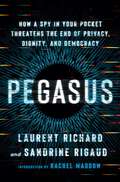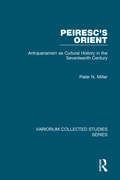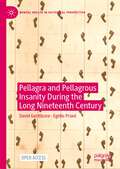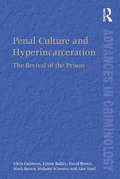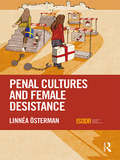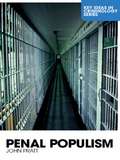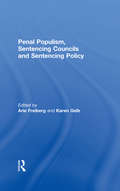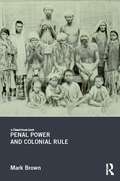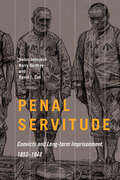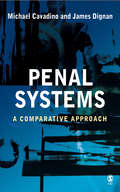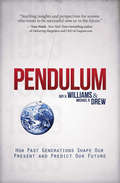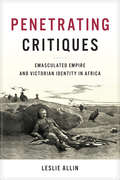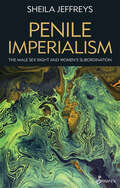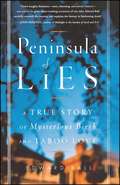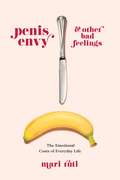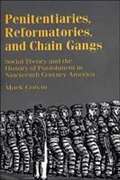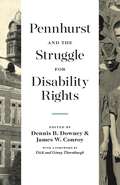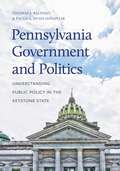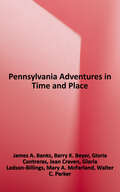- Table View
- List View
Pegasus: How a Spy in Your Pocket Threatens the End of Privacy, Dignity, and Democracy
by Laurent Richard Sandrine RigaudFeaturing an introduction by Rachel Maddow, Pegasus: How a Spy in Our Pocket Threatens the End of Privacy, Dignity, and Democracy is the behind-the-scenes story of one of the most sophisticated and invasive surveillance weapons ever created, used by governments around the world.Pegasus is widely regarded as the most effective and sought-after cyber-surveillance system on the market. The system’s creator, the NSO Group, a private corporation headquartered in Israel, is not shy about proclaiming its ability to thwart terrorists and criminals. “Thousands of people in Europe owe their lives to hundreds of our company employees,” NSO’s cofounder declared in 2019. This bold assertion may be true, at least in part, but it’s by no means the whole story.NSO’s Pegasus system has not been limited to catching bad guys. It’s also been used to spy on hundreds, and maybe thousands, of innocent people around the world: heads of state, diplomats, human rights defenders, political opponents, and journalists.This spyware is as insidious as it is invasive, capable of infecting a private cell phone without alerting the owner, and of doing its work in the background, in silence, virtually undetectable. Pegasus can track a person’s daily movement in real time, gain control of the device’s microphones and cameras at will, and capture all videos, photos, emails, texts, and passwords—encrypted or not. This data can be exfiltrated, stored on outside servers, and then leveraged to blackmail, intimidate, and silence the victims. Its full reach is not yet known. “If they’ve found a way to hack one iPhone,” says Edward Snowden, “they’ve found a way to hack all iPhones.”Pegasus is a look inside the monthslong worldwide investigation, triggered by a single spectacular leak of data, and a look at how an international consortium of reporters and editors revealed that cyber intrusion and cyber surveillance are happening with exponentially increasing frequency across the globe, at a scale that astounds.Meticulously reported and masterfully written, Pegasus shines a light on the lives that have been turned upside down by this unprecedented threat and exposes the chilling new ways authoritarian regimes are eroding key pillars of democracy: privacy, freedom of the press, and freedom of speech.
Peiresc's Orient: Antiquarianism as Cultural History in the Seventeenth Century (Variorum Collected Studies #998)
by Peter N. MillerThe ten essays published in this volume were written over the space of a decade, but they were conceived from the start as a coherent whole, presenting Peiresc's study of discrete languages and literatures of the Near East and North Africa. For Peiresc the student of the Classical past, this described the eastern and southern space in which the Greeks and Romans lived and strove. For Peiresc the Christian, this was the world of the Bible that impacted upon the Greeks and Romans. And for Peiresc of the Mediterranean (for he was born in Aix, spent much time in Marseille, and lived outside of the region for only 6 of his 57 years), this was the territory that his friends and colleagues sailed to, lived in and, usually, came back from. The convergence of these axes in the life of one man, and a man of singular intellectual power and charm whose vast personal paper arsenal had survived, makes this such a compelling project. The essays are arranged in a roughly chronological order. They follow the course of Peiresc’s own projects from his early encounter with the ancient Near East in Greek and Roman literature, through his engagement with Arabic to his deepening kowledge of rabbinic texts to the wider world of the new oriental studies of the seventeenth century which he helped create: Samaritan, Coptic and Ethiopic.
Pellagra and Pellagrous Insanity During the Long Nineteenth Century (Mental Health in Historical Perspective)
by David Gentilcore Egidio PrianiThis open access book explores the history of pellagra, a vitamin deficiency disease brought about by a shift in agriculture to maize, and which was first identified in Italy in the 1760s. With a focus on the insanity that was caused by the disease, the authors examine how thousands of patients were treated in Italian psychiatric asylums, shedding light on the sufferer’s point of view. Setting pellagrous insanity in a wider context of man-made or societal (anthropogenic) disease, where poverty, diet and disease meet, the book contributes to the history of medicine and science, the history of psychiatry, economic and social history, agrarian history, and food and nutrition history. Additionally, the authors aim to transnationalise Italian history by making comparisons with related issues, such as tertiary syphilis in the UK. Drawing from a wide range of printed and archival sources, including the writings of Italian medical investigators, the book examines how medical and scientific research was carried out during the long nineteenth century and the uncertainties that this engendered, in terms of classification, explanation, diagnosis and treatment. Offering a unique perspective on an endemic illness which came to be known as the disease of the four ds: dermatitis; diarrhea; dementia; and death, this book provides an engaging account of one of the most perplexing causes of mental illness.
Penal Abolitionism and Transformative Justice in Brazil (Routledge Frontiers of Criminal Justice)
by Andre R. GiamberardinoPenal Abolitionism and Transformative Justice in Brazil discusses how penal abolitionism provides fundamental theoretical bases and practical references for the construction of a transformative justice in Brazil, supporting the claim that justice is a socially constructed conception and that victims do not unanimously stand for punishment. The book explores how the active participation of the protagonists of a conflict in a face-to-face negotiation of symbolic reparation, can produce a sense of justice without the need to punish or impose suffering on anyone. Mapping the ways that restorative justice in Brazil has distanced itself from the potential of transformative justice, to the extent that it fails to politicize the conflict and give voice to victims, the book shows how it has resulted in becoming just a new version of penal alternatives with correctionalist content. Moving away from traditional criminal justice language and also from conservative approaches to restorative justice, the author argues that the communicative potential of the transformative kind of redress can be dissociated from the unproved assumption that legal punishment is essential or even likely to achieve justice or deterrence. The arguments are grounded in the Brazilian reality, where life is marked by deep social inequalities and a high level of police violence. By providing a review of the literature on restorative justice, transformative justice, and abolitionism, the book contextualizes the abolitionist debate in Brazil and its history in the 19th century. Penal Abolitionism and Transformative Justice in Brazil is important reading for students and scholars who study punishment and penal abolitionism, to think about what it is possible to do in societies so deeply marked by social injustice and a history of oppression.
Penal Culture and Hyperincarceration: The Revival of the Prison (New Advances in Crime and Social Harm)
by Mark Brown David Brown Eileen Baldry Chris Cunneen Melanie Schwartz Alex SteelWhat are the various forces influencing the role of the prison in late modern societies? What changes have there been in penality and use of the prison over the past 40 years that have led to the re-valorization of the prison? Using penal culture as a conceptual and theoretical vehicle, and Australia as a case study, this book analyses international developments in penality and imprisonment. Authored by some of Australia’s leading penal theorists, the book examines the historical and contemporary influences on the use of the prison, with analyses of colonialism, post colonialism, race, and what they term the ’penal/colonial complex,’ in the construction of imprisonment rates and on the development of the phenomenon of hyperincarceration. The authors develop penal culture as an explanatory framework for continuity, change and difference in prisons and the nature of contested penal expansionism. The influence of transformative concepts such as ’risk management’, ’the therapeutic prison’, and ’preventative detention’ are explored as aspects of penal culture. Processes of normalization, transmission and reproduction of penal culture are seen throughout the social realm. Comparative, contemporary and historical in its approach, the book provides a new analysis of penality in the 21st century.
Penal Cultures and Female Desistance (International Series on Desistance and Rehabilitation)
by Linnéa ÖstermanThis book makes a unique contribution to the internationalisation of criminological knowledge about gender and desistance through a qualitative cross-national exploration of the female route out of crime in Sweden and England. By situating the female desistance journey in diverse penal cultures, the study addresses two major gaps in the literature: the neglect of critical explorations of gender in desistance-related processes, and the lack of internationally comparative perspectives on the lived experience of desistance. Grounded in a feminist methodology – underpinned by a critical humanist perspective – this book draws on 24 life-story narrative interviews with female desisters across Sweden and England. The discussion covers departure points, qualitative experiences of criminal justice, as well as barriers and ‘ladders’ in the female route out. While some cross-national symmetry is detected, particularly in the areas of victimisation and issues around short custodial sentences, overall the findings indicate that diverse macro-processes and models, especially in terms of 'inclusive' versus 'exclusive' penal cultures, effectually 'trickle down' to the women in this study and produce different micro-experiences of desistance. Providing new qualitative evidence of the 'Nordic Exceptionalism thesis’, this book finds that, comparatively, the Swedish model offers a macro-context, supported and reflected in allied meso-practices, which is more conducive to the formation of female desistance narratives. This unique comparative study marks a step-change in desistance literature and will be essential reading for those engaged in the disciplines of penology, rehabilitation, gender and crime, and offender management.
Penal Exceptionalism?: Nordic Prison Policy and Practice
by Thomas Ugelvik Jane DullumIn the growing field of comparative criminal justice, the Nordic countries are regularly used as exceptions to the global move towards growing rates of imprisonment and tougher, less welfare-oriented crime-control policies. Why are the Nordic penal institutions viewed as so ‘different’ from a non-Nordic vantage point? Are Nordic prisons and penal policies in fact positive exceptions to the general rule? If they are, what exactly are the exceptional qualities, and why are the Nordic societies lucky enough to have them? Are there important overlooked examples of Nordic ‘bad practice’ in the penal area? Could there be a specifically Nordic way of doing prison research, contributing to the gap between internal and external perspectives? In considering – among others – the above questions, this book explores and discusses the Nordic jurisdictions as contexts for the specific penal policies and practices that may or may not be described as exceptional. Written by leading prison scholars from the Nordic countries as well as selected researchers from the English-speaking world ‘looking in’, this book will be particularly useful for students of criminology and practitioners across the Nordic countries, but also of relevance in a wider geographical context.
Penal Populism (Key Ideas in Criminology)
by John PrattExpertly drawing on international examples and existing literature, Penal Populism closes a gap in the field of criminology. In this fascinating expose of current crime policy John Pratt examines the role played by penal populism on trends in contemporary penal policy. Penal populism is associated with the public's decline of deference to the criminal justice establishment amidst alarm that crime is out of control. Pratt argues that new media technology is helping to spread national insecurities and politicians are not only encouraging such sentiments but are also being led on by them. Pratt explains it is having most influence in the development of policy on sex offenders, youth crime, persistent criminals and anti-social behaviour. This topical resource also covers new dimensions of the phenomenon, including: the changing nature and structure of the mass media less reliance on the more orthodox expertise of civil servants and academics limitations to the impact of populism, bureaucratic resistance from judges, lawyers and academics and the restorative justice movement. This is essential reading for students, researchers and professionals working in criminology and crime policy.
Penal Populism, Sentencing Councils and Sentencing Policy
by Arie Freiberg Karen GelbPublic outcries and political platforms based on misinformation and misconceptions about the criminal justice system and current sentencing practice occur all too often in democratic societies. Penal Populism, Sentencing Councils and Sentencing Policy attempts to address this problem by bringing together important contributions from a number of distinguished experts in the field.Penal Populism presents theoretical perspectives on the role of the public in the development of sentencing policy. It places particular emphasis on the emerging role of sentencing commissions, advisory councils or panels in a number of English speaking countries: Australia, New Zealand, the United States, the United Kingdom, Scotland and South Africa.The book explains, expands and develops the existing literature that looks at public attitudes to justice and the role that the 'public' can play in influencing policy. Written in a scholarly yet accessible style, Penal Populism asks the critical questions: should 'public opinion', or preferably, 'public judgment' be relevant to court decision-making, to institutional decision-making and to the political process? And if so, how?
Penal Power and Colonial Rule
by Mark BrownThis book provides an account of the distinctive way in which penal power developed outside the metropolitan centre. Proposing a radical revision of the Foucauldian thesis that criminological knowledge emerged in the service of a new form of power – discipline – that had inserted itself into the very centre of punishment, it argues that Foucault’s alignment of sovereign, disciplinary and governmental power will need to be reread and rebalanced to account for its operation in the colonial sphere. In particular it proposes that colonial penal power in India is best understood as a central element of a liberal colonial governmentality. To give an account of the emergence of this colonial form of penal power that was distinct from its metropolitan counterpart, this book analyses the British experience in India from the 1820s to the early 1920s. It provides a genealogy of both civil and military spheres of government, illustrating how knowledge of marginal and criminal social orders was tied in crucial ways to the demands of a colonial rule that was neither monolithic nor necessarily coherent. The analysis charts the emergence of a liberal colonial governmentality where power was almost exclusively framed in terms of sovereignty and security and where disciplinary strategies were given only limited and equivocal attention. Drawing on post-colonial theory, Penal Power and Colonial Rule opens up a new and unduly neglected area of research. An insightful and original exploration of theory and history, this book will appeal to students and scholars of Law, Criminology, History and Post-colonial Studies.
Penal Servitude: Convicts and Long-Term Imprisonment, 1853–1948 (States, People, and the History of Social Change #5)
by Barry Godfrey David J. Cox Helen JohnstonEstablished in 1853, after the end of penal transportation to Australia, the convict prison system and the sentence of penal servitude offered the most severe form of punishment – short of death – in the criminal justice system, and they remained in place for nearly a century.Penal Servitude is the first comprehensive study to examine the convict prison system that housed all those who were sentenced to penal servitude during this time. Helen Johnston, Barry Godfrey, and David Cox detail the administration and evolution of the system, from its creation in the 1850s and the building of the prison estate to the classification of prisoners within it. Exploring life in the convict prison through the experiences of the people who were subjected to it, the authors shed light on various details such as prison diet, education, and labour. What they find reveals the internal regimes; the everyday endurances, conformity, resistance, and rule breaking of convicts; and the interactions with the warders, medical officers, and governors that shaped daily life in the system.Reconstructing the life histories of hundreds of convict prisoners from detailed prison records, criminal registers, census data, and personal correspondence, Penal Servitude illuminates the lives of those who experienced long-term imprisonment in the nineteenth and twentieth centuries.
Penal Systems: A Comparative Approach
by James Dignan Mick Cavadino′Cavadino and Dignan′s Penal Systems: A Comparative Approach looks across national boundaries to see how penal systems differ and why. It is hands-down the most comprehensive and up-to-date book on the subject and should become a staple textbook for use in law and social science courses on comparative penal policy and practice′ - Michael H. Tonry, University of Minnesota ′This book is an important addition to the literature on punishment. It is a highly readable and very well researched overview of some of the major differences in punitiveness between neo-liberal, corporatist and social democratic countries… This is a major contribution to comparative penology by two of the leading authors in this field′ - Alison Liebling, Director of the Prisons Research Centre, UK ′A major and seminal work′ - David Downes, Professor Emeritus at the London School of Economics Penal Systems: A Comparative Approach is a comprehensive and original introduction to the comparative study of punishment. Analysing twelve countries, Cavadino and Dignan offer an integrated and theoretically rigorous approach to comparative penology. They draw upon material provided by a team of eminent penologists to produce an important and highly readable contribution to scholarship in this area. Early chapters introduce the reader to comparative penology, set out the theoretical framework and consider whether there is currently a ′global penal crisis′. Each country is then discussed in turn. Chapters on comparative youth justice and the privatization of prisons follow. Comparisons between countries are drawn within each chapter, giving the reader a synoptic and truly comparative vision of penality in different jurisdictions.
Pendelmobilität und partnerschaftliche Arbeitsteilung: Eine Studie über Geschlechterungleichheiten in heterosexuellen Paarbeziehungen
by Anna StenpaßAnna Stenpaß verbindet in dieser Studie quantitative und qualitative Daten, um ein umfassendes Bild von einem bisher wenig erforschten Untersuchungsfeld zu erhalten. Anhand eines Mixed-Methods Ansatzes untersucht sie den Einfluss beruflicher Pendelmobilität auf die innerpartnerschaftliche Verteilung der Hausarbeit und Kinderbetreuung. Sie verdeutlicht, dass eine ungleiche Verteilung dieser Arbeiten auch im Zusammenhang mit der Pendelmobilität besteht. Insbesondere weibliche Pendler tragen oftmals weiterhin die Hauptverantwortung für die Hausarbeit und Kinderbetreuung, auch wenn sie neben der Erwerbstätigkeit berufsbedingt pendeln – und stehen damit einer Dreifachbelastung gegenüber. Wohlgleich verdeutlichen die Analysen, dass sich auch Möglichkeiten 'harmonischer' Arrangements etablieren lassen. Wie die Pendler*innen mit den unbezahlten Arbeiten umgehen und welche Arrangements sie im Umgang mit diesen herstellen, hängt von einem Zusammenspiel handlungstheoretischer Aspekte, normativer Einstellungen sowie der subjektiven Wahrnehmung der Pendelmobilität und deren Nutzen und Kosten ab.
Pendulum
by Roy H. Williams Michael R. DrewWestern Society has recently completed a predictable 40-year shift from an Idealist or “Me” system of values to a Civic or “We” way of thinking. These shifts happen with the regularity of a pendulum every 40 years. The most recent 6-year “shift window” opened in 2003 and was closed in 2008. The previous shift-headed in the opposite sociological direction, from “We” to “Me”-opened in 1963 and closed in 1968. These sociological shifts have a profound impact on politics, the economy, advertising, and entertainment. Those who are in step with these shifts succeed. Those who are out-of-step do not. Through the wisdom and wit of bestselling author, sought-out speaker, and advertising mastermind Roy H. Williams,The Pendulumteaches you to navigate complex social patterns to help you achieve the success you desire in your personal and professional lives.
Pendulum
by Roy H. Williams Michael R. DrewPolitics, manners, humor, sexuality, wealth, even our definitions of success are periodically renegotiated based on the new values society chooses to use as a lens to judge what is acceptable. Are these new values randomly chosen or is there a pattern?Pendulum chronicles the stuttering history of western society; that endless back-and-forth swing between one excess and another, always reminded of what we left behind.There is a pattern and it is 40 years: 2003 was a fulcrum year, as was 1963, its opposite.Pendulum explains where we have been as a society, how we got here, and where we are headed. If you would benefit from a peek into the future, you would do well to read this book.
Penetrating Critiques: Emasculated Empire and Victorian Identity in Africa
by Leslie AllinTracing the intersections between archival documents and immensely popular adventure fiction set in Africa, Penetrating Critiques highlights the anxieties surrounding the vulnerability of the white male body by assessing the destabilization of narrative itself. The author considers texts ranging from private letters, governmental correspondence, periodicals, and archives to the popular works of H. Rider Haggard, Richard Marsh, and Joseph Conrad. These texts trouble the notions of bounded male bodies, impermeable histories, and solid virtues while underscoring the grotesqueness of male forms, narratives, and moralities. Although dominant representations of martial bodies frequently emphasized boundaries, containment, and solidity, the fiction and imperial archives explored in this book expose problems of stability through tropes, images, and material evidence of perforation, penetration, and dissolution. In emphasizing the relationship between institutional imperial writing and popular discourse, Penetrating Critiques reveals that more complex, fraught, and critical approaches to imperialism and masculinity were circulating throughout Victorian culture than previously recognized.
Penile Imperialism: The Male Sex Right and Women's Subordination
by Sheila Joy JeffreysIn this blisteringly persuasive and piercingly intelligent book, Sheila Jeffreys argues that women live under penile imperialism, a regime in which men are assumed to have a ‘ sex right' of access to the bodies of women and girls. She reasons that the ‘ sexual revolution' that began in the 1960s unleashed an explicit male sexual liberation and that even now, under current laws and cultural mores, women do not have the right to self-determination in relation to their bodies.Sheila Jeffreys argues that the exercise of the male sex right has mainstreamed misogynist attitudes and so-called sexual freedom has meant the freedom of men to use women and children with impunity. The power dynamics of sex, rather than being eliminated, has been eroticised, supported by state regulations and structures that have further entrenched male domination. And while men' s sexual fetishisms such as BDSM and transvestism have been normalised, women now have to fight as their spaces are being erased and their voices silenced in a faux inclusivity that has ‘ naturalised' sexual harassment. Sheila Jeffreys contends that women' s human rights are profoundly harmed and sexual violence is used more than ever to enforce social control of women.This is a sobering and brilliant analysis of the modern predicament of women that is impossible to ignore.
Peninsula of Lies: A True Story of Mysterious Birth and Taboo Love
by Edward BallPeninsula of Lies is nonfiction mystery, set in a haunting gothic locale and peopled by fascinating and eccentric characters. Its hero and heroine is Dawn Langley Simmons, a British writer who lived in Charleston, South Carolina, during the 1960s and became the center of one of the most unusual sexual scandals. Born in England, Dawn began life as a boy named Gordon Langley Hall, the son of servants at Sissinghurst Castle, the estate of Vita Sackville-West. In his twenties he made his way to New York, where he wrote about and befriended great society ladies. A small fortune inherited from Isabel Whitney allowed him to buy and decorate a mansion in Charleston. But Gordon's world changed in 1968 when at The Johns Hopkins Hospital he underwent one of the first sexual reassignment surgeries, scandalizing the Southern community that had welcomed him. Months later Gordon shocked Charleston again. Gordon -- now Dawn -- married a young black mechanic, soon appeared to be pregnant, and shortly thereafter became the mother of a young girl. National Book Award-winning author Edward Ball has written a detective story that unwraps Dawn's many mysteries. The result is an engrossing narrative of a person who tested every taboo, as well as the confidence of observers in their own eyes.
Penis Envy and Other Bad Feelings: The Emotional Costs of Everyday Life
by Mari RutiMari Ruti combines theoretical reflection, cultural critique, feminist politics, and personal experience to analyze the prevalence of bad feelings in contemporary everyday life. Proceeding from a playful engagement with Freud’s idea of penis envy, Ruti’s autotheoretical commentary fans out to a broader consideration of neoliberal pragmatism. She focuses on the emphasis on good performance, high productivity, constant self-improvement, and relentless cheerfulness that characterizes present-day Western society. Revealing the treacherousness of our fantasies of the good life, particularly the idea that our efforts will eventually be rewarded—that things will eventually get better—Ruti demystifies the false hope that often causes us to tolerate an unbearable present.Theoretically rigorous and lucidly written, Penis Envy and Other Bad Feelings is a trenchant critique of contemporary gender relations. Refuting the idea that we live in a postfeminist world where gender inequalities have been transcended, Ruti describes how neoliberal heteropatriarchy has transformed itself in subtle and stealthy, and therefore all the more insidious, ways. Mobilizing Michel Foucault’s concept of biopolitics, Jacques Lacan’s account of desire, and Lauren Berlant’s notion of cruel optimism, she analyzes the rationalization of intimacy, the persistence of gender stereotypes, and the pornification of heterosexual culture. Ruti shines a spotlight on the depression, anxiety, frustration, and disenchantment that frequently lie beneath our society’s sugarcoated mythologies of self-fulfillment, romantic satisfaction, and professional success, speaking to all who are concerned about the emotional costs of the pressure-cooker ethos of our age.
Penitentiaries, Reformatories, and Chain Gangs
by Mark ColvinThis book presents information on both the historical development of punishments in the US and the theoretical interpretations of these developments. Colvin (sociology, George Mason U.) examines rival theories of the transformation of punishment systems and penal practices; the rise of penitentiaries in the Northeast; the changing perception and punishments of female offenders through the last 150 years; the transformation of criminal punishment in the South; and today's corrections system.
Pennhurst and the Struggle for Disability Rights (Keystone Books)
by Dennis B. Downey James W. ConroyConceived in the era of eugenics as a solution to what was termed the "problem of the feeble-minded," state-operated institutions subjected people with intellectual and developmental disabilities to a life of compulsory incarceration. One of nearly 300 such facilities in the United States, Pennhurst State School and Hospital was initially hailed as a "model institution" but was later revealed to be a nightmare, where medical experimentation and physical and psychological abuse were rampant. At its peak, more than 3,500 residents were confined at Pennhurst, supervised by a staff of fewer than 600.Using a blended narrative of essays and first-person accounts, this history of Pennhurst examines the institution from its founding during an age of Progressive reform to its present-day exploitation as a controversial Halloween attraction. In doing so, it traces a decades-long battle to reform the abhorrent school and hospital and reveals its role as a catalyst for the disability rights movement. Beginning in the 1950s, parent-advocates, social workers, and attorneys joined forces to challenge the dehumanizing conditions at Pennhurst. Their groundbreaking advocacy, accelerated in 1968 by the explosive televised exposé Suffer the Little Children, laid the foundation for lawsuits that transformed American jurisprudence and ended mass institutionalization in the United States. As a result, Pennhurst became a symbolic force in the disability civil rights movement in America and around the world.Extensively researched and featuring the stories of survivors, parents, and advocates, this compelling history will appeal both to those with connections to Pennhurst and to anyone interested in the history of institutionalization and the disability rights movement.
Pennhurst and the Struggle for Disability Rights (Keystone Books)
by Dennis B. Downey James W. ConroyConceived in the era of eugenics as a solution to what was termed the “problem of the feeble-minded,” state-operated institutions subjected people with intellectual and developmental disabilities to a life of compulsory incarceration. One of nearly 300 such facilities in the United States, Pennhurst State School and Hospital was initially hailed as a “model institution” but was later revealed to be a nightmare, where medical experimentation and physical and psychological abuse were rampant. At its peak, more than 3,500 residents were confined at Pennhurst, supervised by a staff of fewer than 600.Using a blended narrative of essays and first-person accounts, this history of Pennhurst examines the institution from its founding during an age of Progressive reform to its present-day exploitation as a controversial Halloween attraction. In doing so, it traces a decades-long battle to reform the abhorrent school and hospital and reveals its role as a catalyst for the disability rights movement. Beginning in the 1950s, parent-advocates, social workers, and attorneys joined forces to challenge the dehumanizing conditions at Pennhurst. Their groundbreaking advocacy, accelerated in 1968 by the explosive televised exposé Suffer the Little Children, laid the foundation for lawsuits that transformed American jurisprudence and ended mass institutionalization in the United States. As a result, Pennhurst became a symbolic force in the disability civil rights movement in America and around the world.Extensively researched and featuring the stories of survivors, parents, and advocates, this compelling history will appeal both to those with connections to Pennhurst and to anyone interested in the history of institutionalization and the disability rights movement.
Pennsylvania Government and Politics: Understanding Public Policy in the Keystone State (Keystone Books)
by Thomas J. Baldino Paula A. Duda HoloviakThis book provides a comprehensive examination of the Keystone State’s formal and informal political institutions and players, past and present, and elucidates the place each holds in governing the commonwealth today. Covering a period of more than three hundred years, this volume presents a clear and succinct overview of• the commonwealth’s political history, culture, and geography;• interactions between office holders, civil servants, special interest groups, and the media;• policy development and implementation;• how laws are created, enacted, and enforced;• hierarchy and interaction among state, county, local, and special district government bodies and officials;• tax collection and disbursement; and• the political upheaval in the wake of the COVID-19 pandemic and the 2020 presidential election.Featuring practical appendixes and interviews with current and past office holders, bureaucrats, party leaders, and political journalists, this astute and informative book is an indispensable tool for understanding politics in the Keystone State.
Pennsylvania: Adventures in Time and Place
by James A. Banks Walter C. Parker Gloria Ladson-Billings Barry K. Beyer Gloria Contreras Jean Craven Mary A. McFarlandThis book has eleven chapters. Each chapter has two or more lessons. There are also many special features for you to study and enjoy. - Special pages bring your ideas in geography from National Geographic. - Some lessons have features called Links or Did You Know- activities to try and interesting information to share. - Look for a variety of lessons and features. Infographics inform you with pictures and maps. You will build skills, learn about Legacies that connect us to the past, and meet people who show what Citizenship is. - The end of the book has a Reference Section with many types of information. Use it to look up words, people, and places. - Lessons begin with a Read Aloud selection and The Big Picture. Study with the Read to Learn question and a list of words, people, and places. Enjoy Many Voices-writings from many sources.
